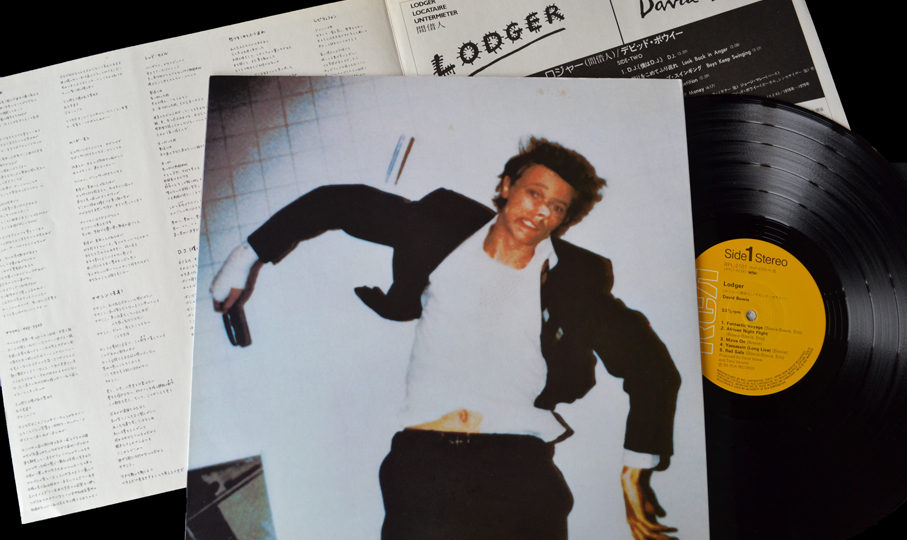
David Bowie – Lodger (1979)
‘Lodger’ is the final album in the Bowie/Eno trilogy of Berlin albums starting with Low (1977) and Heroes (1977). Each of them heavily is influenced by the zeitgeist of (West-) Berlin, whereas title and cover of Lodger are a direct reference to Roman Polanski’s movie ‘The Tenant’ from 1976.
West Berlin’s underground scene was burgeoning with two assets for our duo in the 70s: 1) the innovative, modern sounds of Electronic music, Can, Neu! and Kraftwerk. 2) Easily accesible drugs and the city’s notorious club-culture mainly centered in the multicultural quarter Kreuzberg was the atmosphere that fueled the creation of three of Bowie’s most influential albums.
The Berlin albums may just yet prove to be Bowie’s most-lasting artistic statement(s). Being in the right place at the right time and with the right people – Bowie/Eno forged alliances between the art-punk of Funhouse and the robotic ambience of Neu! and Eno’s Discreet Music. Bowie/Eno didn’t invent these terms or the elements of the music. History (or fate) placed them in a position to take advantage of the resources and tool at their disposal. With all that creativity happening around them, Bowie and Eno recognized their unique opportunity and created three albums that sound as forward thinking in 2019 as they did in 1979.
Let’s note that ‘Lodger’ is decidedly different from either of the other two albums in the Berlin Trilogy. Firstly, the recording of Lodger didn’t actually take place in Berlin or even in Germany. It was recorded in Switzerland were Bowie was actually a legal resident. The album is also a return to a more traditional guitar and drum sound. A step away from the icy cool Krautrock. Less sophisticated and more primal new wave. You can’t help but hear the raw punk-prog of Pere Ubu and the early Talking Heads. Tracks like ‘DJ’ and ‘African Night Flight’ with their offbeat arrangements feel anxious and uncomfortable. Pulling and tearing at themselves hoping to stretch outside their pop structures.
‘Lodger’ is the forgotten gem of the “Berlin Triptych”. While it has a distinctively different feel, it’s certainly an important part of the period and worthy of the noble company.
by Shawn Ciavattone

Very specific and lovely review, Shawn. “Lodger” is one of the weirdest and most unaccessible Bowie albums. For me, it doesn’t capture the same energy as “Low” or “Heroes”, but its a great and unique album on its own. The experiments with world music gave the album a very special sound. And I agree, it´s the most underrated Bowie album. Great work !
It’s absolutely different the those others albums in the Berlin trio. Saliha mention the difference below. A off-beat funkiness that to me foreshadowed The talking heads, life during wartime. I can also hear the odd rhythms of pere Ubu. Stick with this one. Once it clicks, you’ll love it forever.
Lodger reveals a key message in the master’s legacy: “I am a DJ, I am what I play, can’t turn around now ” Always looking forward, never stopping in the past, neither in terms of content nor musically: That was Bowie, and that is the fascination that still results from his output, which keeps inspiring new generations.
I couldn’t agree more. David Bowie brought us some much in terms of showing more mainstream audiences outsider music and radical thinking too. But the Berlin albums are the ones I grab for most often.
Lodger is somewhat overlooked, maybe it is its Swiss DNA, lol. No, besides the marvelous cover, it’s actually a quite funky album, adding Disco and oriental rhythms to the trilogy, that’s maybe why I have a thing for it. Like many underrated albums it sounds fresher than most of his albums.
I remember seeing advertisements for the record when I was a boy. They used the video for DJ for a short television commercial on a few targeted shows. This video would usually upset my parents greatly. Much to my delight and I would sing “I am a DJ. I am what I play” making up my own song around the lyrics. Lol. Shawn 1. Parents 0. 🕺
Look back in anger is one of the very best songs Bowie has ever written! Such an underrated album!
The album is the Definition of a grower. I think a lot of people are put off by this album at first but warm up to it in the long run.
Lovely review. For the non-Bowie fan it is certainly challenging to hear “African Night Flight” or “Yassassin” for the first time. But once you give in to the music, you quickly understand why Bowie is far above all other musicians.
My favorite of the trio. The new remix is really ear opening.